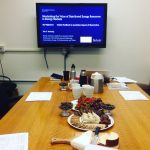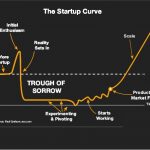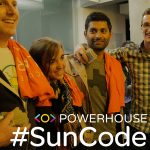Last week I attended the American Controls Conference, an academic conference focused on classical controls and optimization. While this was the first time I had attended, this is one of biggest conferences for the eCAL lab’s research, » Read More

Energy, Learning, and Optimization

Last week I attended the American Controls Conference, an academic conference focused on classical controls and optimization. While this was the first time I had attended, this is one of biggest conferences for the eCAL lab’s research, » Read More

After finishing my qualifying exams, I had just a few days at home before leaving for the East Coast to take part in the Coalition for National Science Funding’s Exhibition Day on Capitol Hill. Part of a contingent with representation from 5 of the University of California campuses, » Read More

Every PhD student dreads Qualifying Exams, the big checkpoint en route to the dissertation. In Berkeley’s college of engineering, they have particular weight: as there isn’t a thesis defense, the 3-hour oral Qualifying Exams is the one big check on your research progress. » Read More

I just got back from 3 hurried days in San Diego for the kickoff of the Innovation Corps training, an entrepreneurship bootcamp for university researchers funded by the National Science Foundation with the goal of improving the commercialization of NSF-funded research. » Read More

Every year I look forwards to the Suncode hackathon, organized by the Powerhouse solar incubator in Oakland, CA. Participating in the 2015 Suncode hackathon gave me the courage to help organize the Cleanweb Berkeley hackathon, and taught me an immense amount about the solar industry. » Read More
Solar panels, electric vehicles, smart appliances, and storage systems are rewriting the electricity production landscape. When used intelligently, these Distributed Energy Resources (DERs) can reduce cost, improve reliability, and help fight global warming by integrating more renewable energy into the electricity grid. » Read More
Blockchains are often described as “trustless”: this doesn’t mean that they can’t be trusted- but instead that the users don’t have to trust each other. In many applications, this is what sets them apart from conventional technologies- the lack of a centralized figure like a bank, » Read More
Blockchains are fascinating- a platform for robust, immutable, and trustless data storage and computation. But they’re also cumbersome- slow, inefficient, and expensive. So when are blockchains the right solution for a problem? Blockchains are not a magical new type of computing. » Read More
Download the full Jupyter/iPython notebook from Github here
Build Your Own Blockchain – The Basics¶
This tutorial will walk you through the basics of how to build a blockchain from scratch. Focusing on the details of a concrete example will provide a deeper understanding of the strengths and limitations of blockchains. » Read More

In addition to participating in a variety of hackathon, I’ve helped organize the Cleanweb Berkeley hackathon twice. From my experience on both sides of the judging stand, I have a few thoughts on what makes a good hackathon- and it’s more than just big prizes or awesome prompts. » Read More